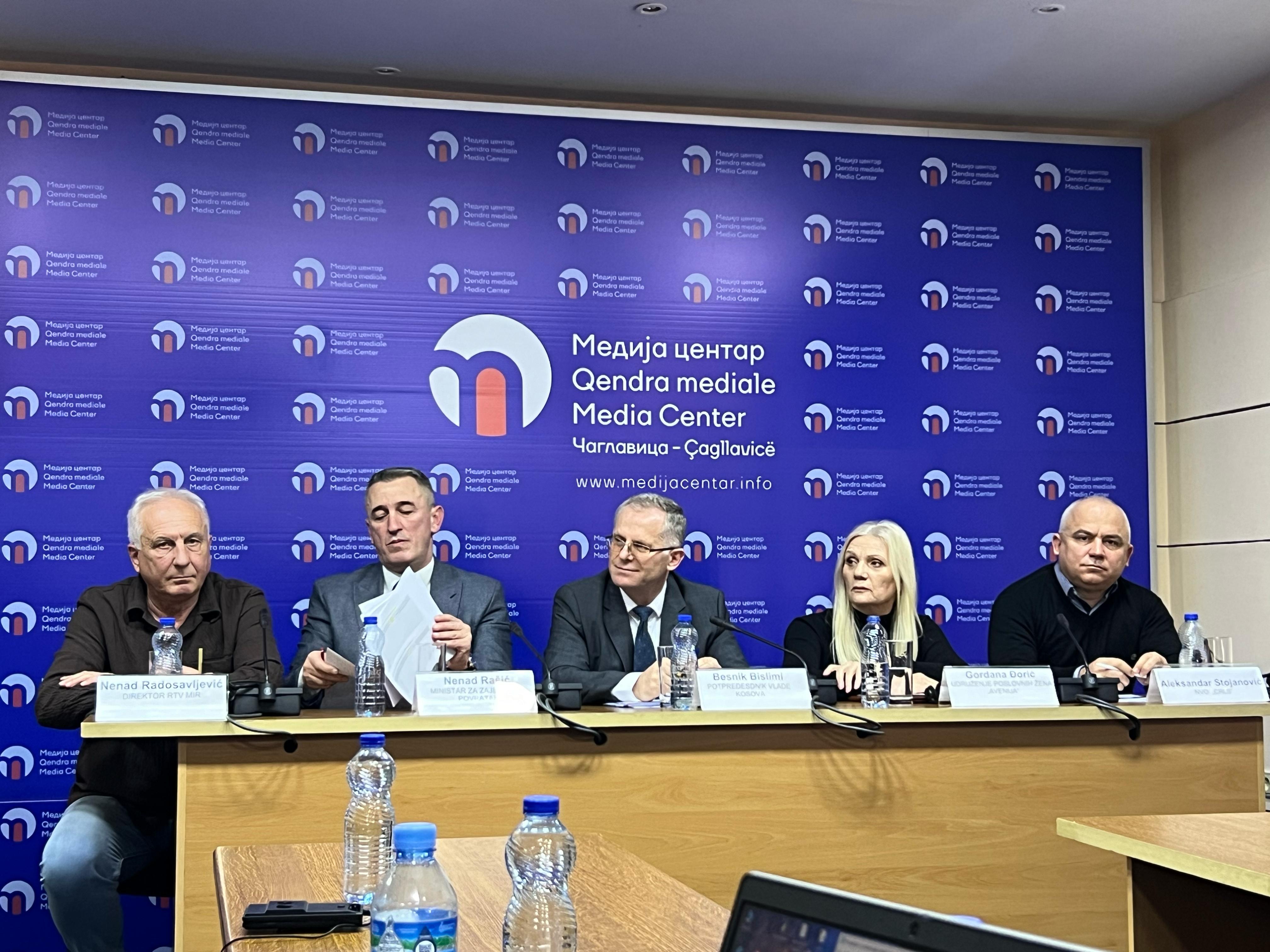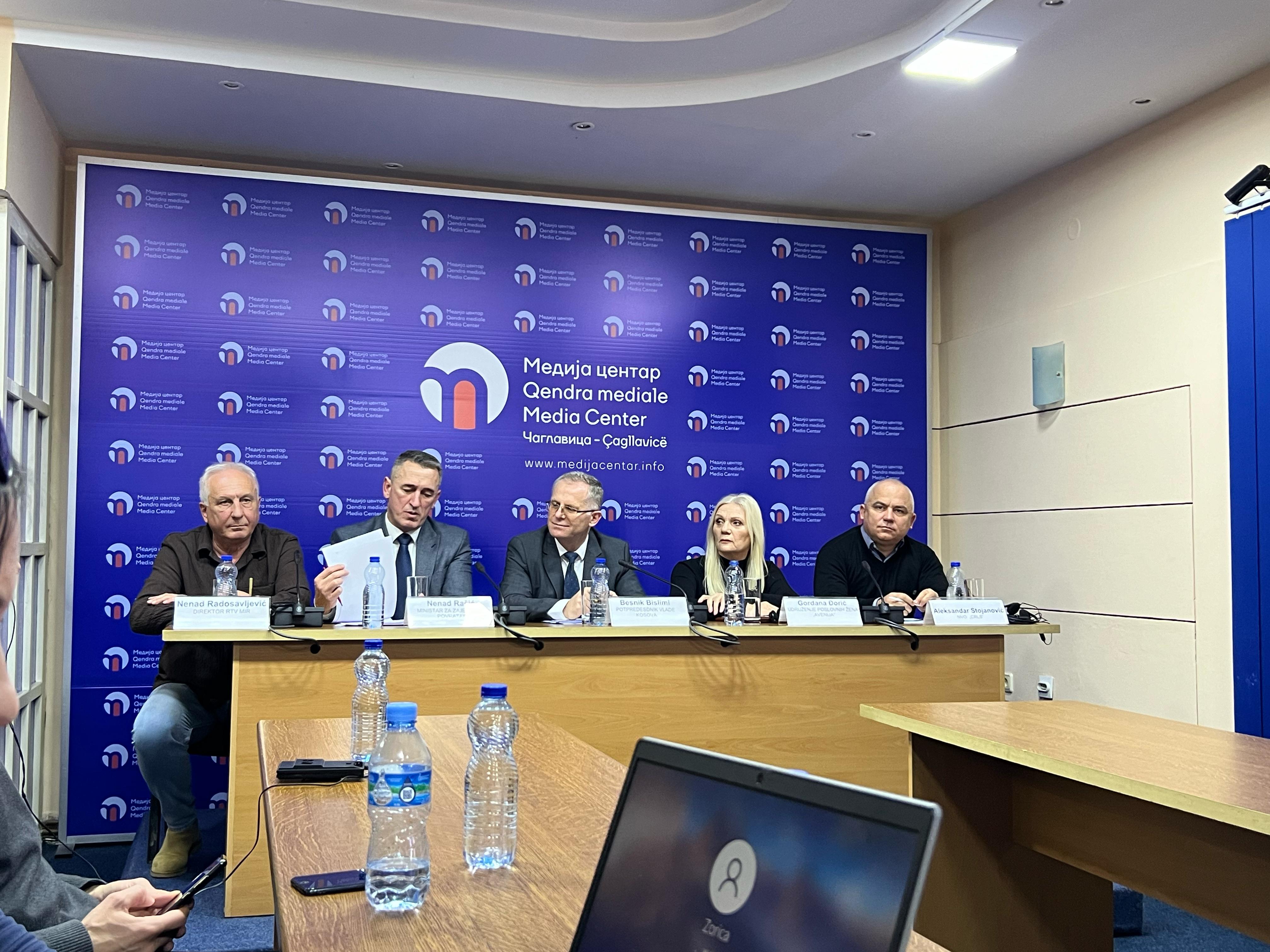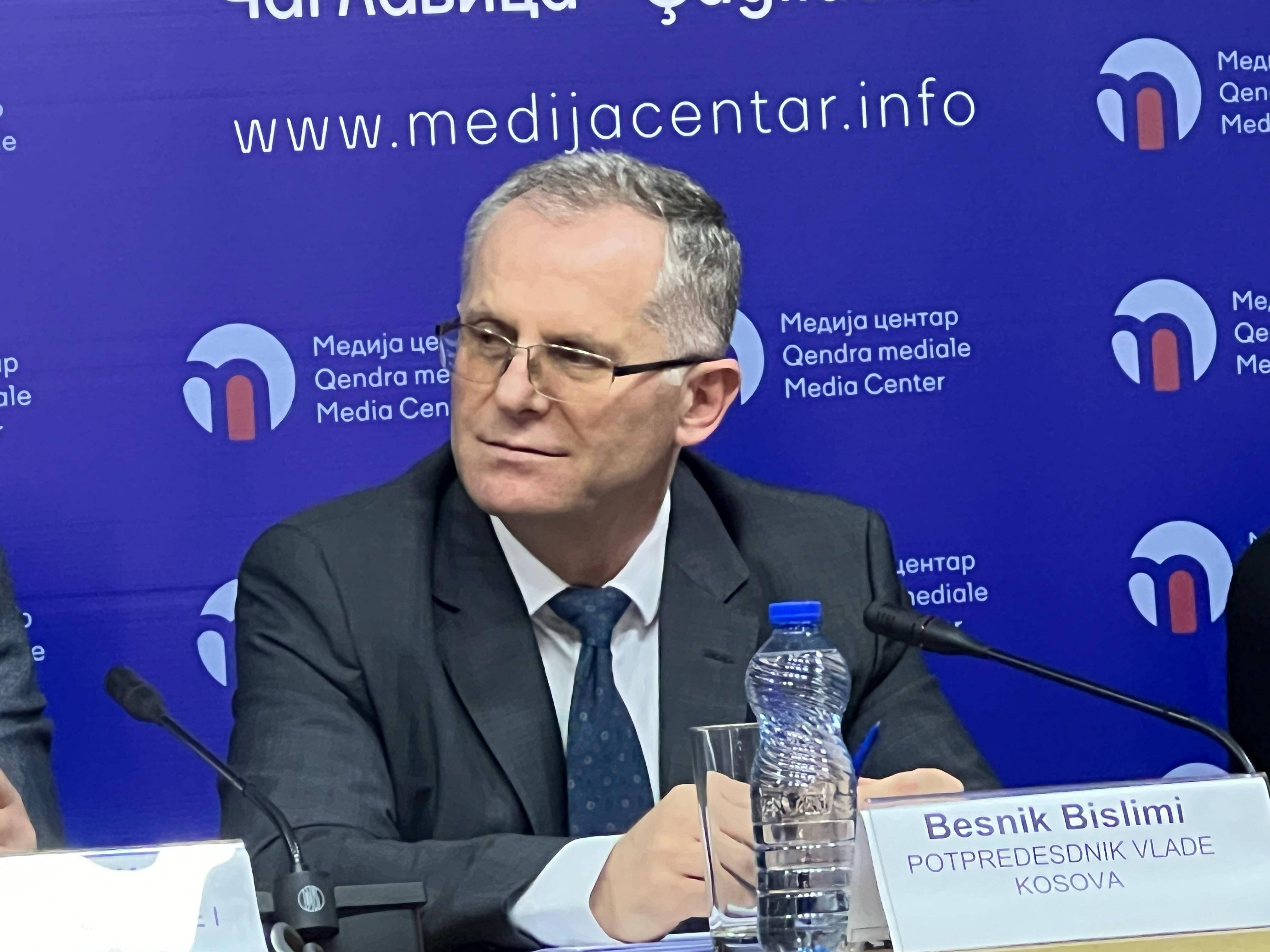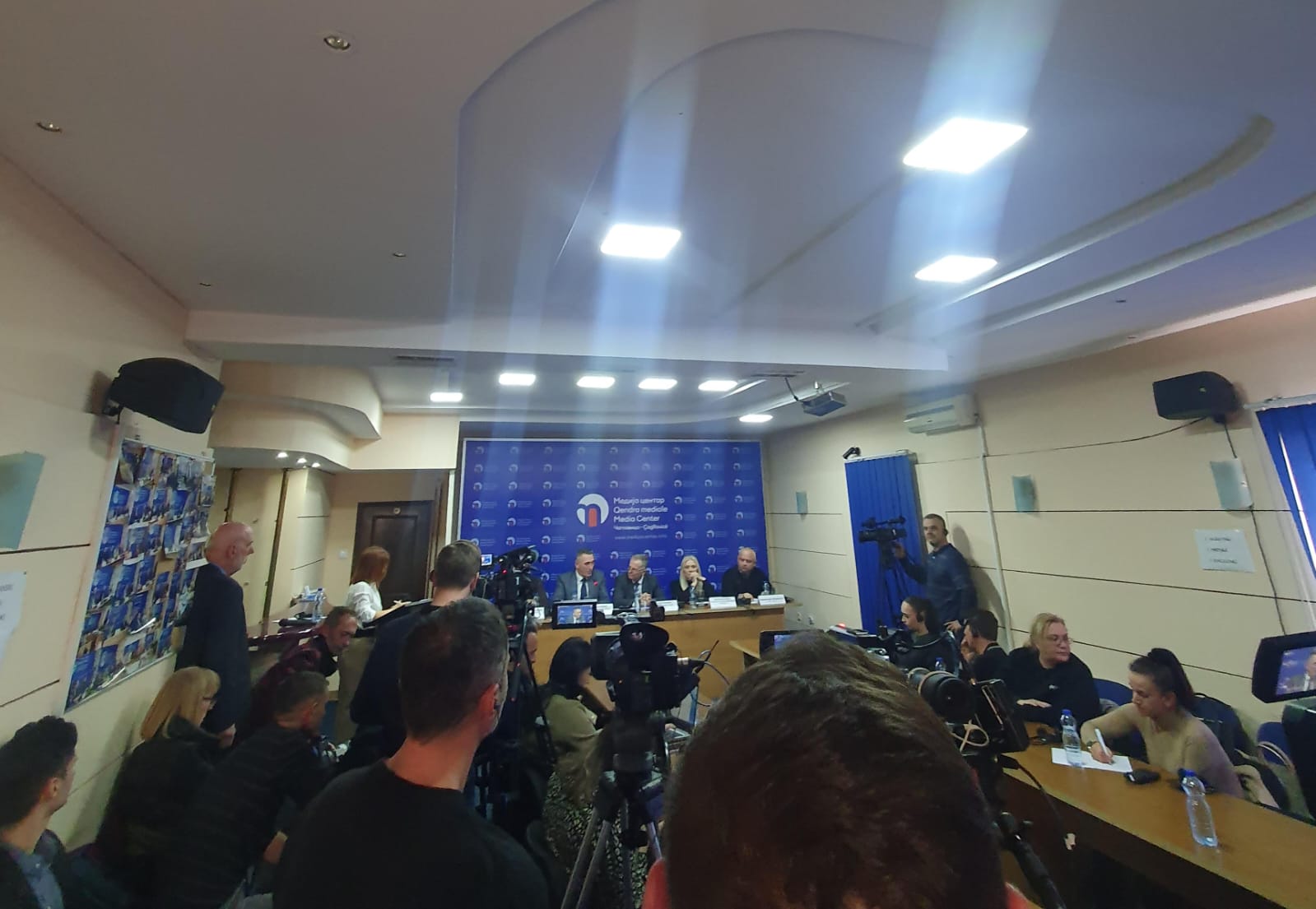The first Deputy Prime Minister for European Integration, Development and Dialogue, of the Republic of Kosovo, Besnik Bislimi, took part in the discussion panel “Economic Development for Kosovo Serbs”, organized at Media Center Cagllavica. The panel was attended by the Minister for Communities and Returns, Nenad Rashić, and civil society actors from the Serbian community in Kosovo.
In his introductory speech, Deputy Prime Minister Bislimi said that “there is no better way to deepen cooperation and integration than when talking about economic development and employment growth.”
He added that the Government’s commitment to supporting economic development for the Serbian community also goes through 5 steps such as: the support we offer to enterprises, the increase in the formalization of the economy, the strengthening of aggregate demand, the direct support of infrastructure projects, and the increase of efficiency by fighting corruption and smuggling, creating space for the flourishing of entities that act in accordance with the law.
While a program which would support the coordination and cooperation of municipalities with Serbian majority with other municipalities in Kosovo, extends to three levels: inter-municipal cooperation for the joint provision of certain municipal services, the cooperation of economic enterprises between these municipalities and the intensification of cooperation between civil society organizations of municipalities with different ethnic composition.
He also recalled that last week, Minister Rashiq together with the Minister of Finance, Labor and Transfers, Hekuran Murati, presented the new platform, which aims to create 2000 jobs, subsidizing up to 70 percent of the salary or up to 350 euros for a period of 6 months.
On the CBK regulation, he said that “The regulation of the Central Bank, which was published on December 27 of last year, we emphasized several times that it does not have as objective, nor does it deal with any currency that is in circulation. The main focus, according to the interpretations of the Central Bank, has been to increase the security of the banking system and the payment system.” He added that the Central Bank has released a series of activities and measures with which it aims to mitigate this impact, and in the coming days the Government of the Republic of Kosovo will come out with a list of 10 measures, with which we will show how we will take care that the citizens are not harmed in this transitory phase, but a phase which would then guarantee the full implementation of the formalization of the payment system.
“I think it is a good start to focus more on the economy and towards the generation of jobs, because this is the best strategy to ensure a sustainable integration for all.” he concluded.
The full speech of Deputy Prime Minister Bislimi:
Thank you very much for the opportunity that today, together with Minister Rashiq and our respected colleagues and friends of the civil society, we can discuss the possibilities for economic development. For me, it is also an advantage because this topic matches the ideas that I started from my background, which I think there is no better way to deepen cooperation and integration than when talking about economic development and employment growth. And I think that the best contribution we can make in this direction is to treat the issue of integration of non-majority communities with the same criteria as the criteria for the economic advancement of the entire population of Kosovo. What we do in Kosovo, I think should be a priority even when it comes to the Government’s commitment to supporting economic development in municipalities with Serb majority. I wanted to briefly mention the mechanisms through which we act in the introduction.
The first step is the support we offer to enterprises, whether they are organizing enterprises, joint stock companies, or enterprises created by the self-employment of small entrepreneurs. We do this through support programs with grants and subsidies directly, or even indirectly, supporting the creation of jobs that these entities enable.
We have seen last week the visit of Minister Rashiq together with the Minister of Finance, Labor and Transfers, Mr. Hekuran Murati in the north of Kosovo, where they presented the new platform, which aims to create 2000 jobs, subsidizing up to 70 percent of the salary or up to 350 euros for a period of 6 months. The feedback we have received is that this measure has been extremely well received in the north and it is very important to emphasize that the current calculations of the ministry are that the potential to generate new jobs is around 2000, but if that we see that there is willingness and interest of entrepreneurs to create more jobs, this measure can be freely extended for another 2000 places and what is very important is that such a measure can be freely extended also in other municipalities with a Serbian majority in the rest of Kosovo.
Another support [the second step], which we give to the empowerment of businesses in these municipalities, is also through the increase in the formalization of the economy, and I think that in this context the idea of the measure presented by Minister Rashiq should also be seen, since technically for the Ministry of Finance, Labor and Transfers, every job that is announced, whether it is a new job or a formalization of existing jobs, will be treated the same, so the criteria for evaluation will be the same, but the formalization means that the transactions, which are performed by the participants in this economic cycle, all must be registered, because only in this way is the equality of competition ensured. Therefore, the regulation of the Central Bank, which I will talk about a little later, should be interpreted in this light.
The other [third] element, through which we support the strengthening of the economy sector in the municipalities, is also through the strengthening of aggregate demand. All government programs during 2022 and 2023 have aimed at a redistribution of national income, which has gone from the budget to those categories of society that have a greater tendency to consume local products. It means that if we allocate budget funds for pensioners or children, the probability that they will use this additional purchasing power to buy local products is greater and in this way, then, indirectly, the local economy is strengthened.
Even the fourth pillar, which for me is very important, is the direct support of infrastructure projects which are supported through three channels, two of which are under the control of the Government of Kosovo. The first channel is the budget allocated to the municipalities which clearly have the category of capital investments, either local or inter-regional, and the aim of these investments is to improve the lives of citizens and increase the competitiveness of businesses.
For example, if we improve the road infrastructure in Zubin Potok, this speeds up the delivery period of the goods or products that the farmers of Zubin Potok produce to the markets in other parts of Kosovo and thus increases the chance that they can generate additional income. The second channel through which the infrastructure is supported mainly applies only to the four municipalities in the north of Kosovo, is the trust fund, in which the budget funds that we collect at the border points in Jarinje and Bërnjak are poured and used for investments according to the request of the municipal leadership directed to a panel where the vote is then made by a representative of the EU in Kosovo, the Minister of Finance and the representative of the four municipalities in the north of Kosovo.
The fifth pillar, which is more important, is the indirect strengthening of the economy through increasing efficiency, this is done by fighting corruption, smuggling and others, which creates space for the flourishing of entities that act in accordance with the law. In addition, we are in a phase of designing and conceptualizing larger infrastructure projects, e.g. all the data show that the municipalities of Leposaviq and Zubin Potok have more than proportional potential for the generation of renewable energy, but this requires larger funds and in cooperation with the EU.
But at the moment we are testing the possibilities of the government, but also the readiness of foreign and serious businesses to enter this market and create space for the generation of renewable energy in the four municipalities in the north of Kosovo.
I am saying that the measurements show that there is great potential. We have also designed and are working on building our absorptive capacities, a much larger cooperation project with the European Union which can either be part of the Growth Plan or the annual IPAs, or it can be part of the donor conference that is expected to be organized at the moment when there is a satisfactory implementation of the Basic Agreement between Kosovo and Serbia, agreed on February 27 of last year.
A program which would support the coordination and cooperation of municipalities with a Serbian majority with other municipalities of Kosovo, lies also on three levels. Inter-municipal cooperation for the joint provision of certain municipal services, let’s say a water supply company in Shtërpce would cooperate with a water supply or waste collection company in Ferizaj.
Then, the other part would be the pillar of economic enterprise cooperation between these municipalities and the third pillar, the intensification of cooperation between civil society organizations of municipalities with different ethnic composition.
In the decision or regulation of the Central Bank, which was published on December 27 of last year, we emphasized several times that the regulation doesn’t have as objective, nor does it deal with any currency that is in circulation. The main focus, according to the interpretations of the Central Bank, has been to increase the security of the banking system and the payment system, and this security has been attacked by three elements.
The first element has been from a very large proportion of the use of the 500 euro banknote in circulation, it is known that such banknote in a relatively small economy like Kosovo, are usually used when dealing with transactions outside the formal economy, and the experiences of last month show that this concern of the Central Bank has been very legitimate since in a few weeks the Central Bank has withdrawn from circulation 165 thousand banknotes of 500 euros, which is a total of 83 million euros. You can imagine for an economy like Kosovo, how much this means for the security of transactions in the formal economy.
The second part is about the protection of consumers from the circulation of fake coins and you have witnessed that in recent times we have had an attack which does not come from Kosovo, but the entry of fake coins comes from the neighboring countries of Kosovo, but this then creates trouble for all users of the euro currency.
And the third concerns the import and export of currencies as a whole, not only the euro, but all currencies, including the American dollar, the Albanian lek, the Serbian dinar, that means all the currencies in Kosovo, for which legality must be established. This is also a requirement of the Berlin process, where the use of the SEPA mechanism is required by all Western Balkan countries and you cannot join here without managing to consolidate the payment system within the territory of Kosovo.
We are aware that in the short term the implementation of this measure may create difficulties for a part of the citizens who have received and continue to receive financial support from the Republic of Serbia. The Central Bank has issued a series of activities and measures with which it aims to mitigate this impact, and in the following days the Government of the Republic of Kosovo will come out with a list of 10 measures, with which we will show how to take care that the citizens are not harmed in this transitory phase, but a phase which would then guarantee the full implementation of the formalization of the payment system.
Once again, thank you very much for the opportunity. I think it is a good start to focus more on the economy and towards the generation of jobs, because this is the best strategy to ensure a sustainable integration for all.
I am concluding saying that once again the citizens of the Republic of Kosovo can only walk at the pace with which the members of the minorities also walk, therefore we see the obligation of the majority in Kosovo to work more towards integration and the development of cooperation with the members of other minorities in Kosovo.
Thank you very much once again.
Last modified: February 21, 2024



